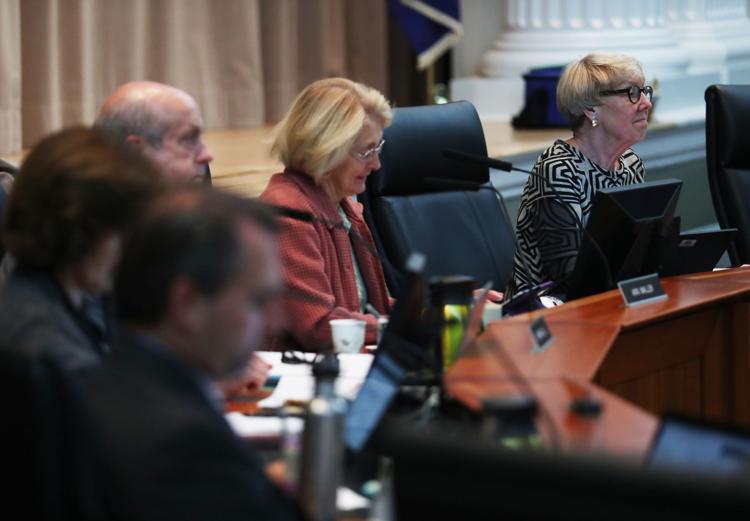April 3, 2019. The Daily Progress.
Albemarle County will soon be starting a process for updating its affordable housing policy.
On Wednesday, the Albemarle County Board of Supervisors approved moving forward with the update using information from a regional housing needs assessment. The board was provided with a summary of Albemarle’s data.
Stacy Pethia, the county’s principal planner for housing, presented the data to the board, which showed that about 20% of all homeowners and 34% of renter households, or 10,700 of the county’s 42,479 households, are estimated to be cost-burdened, which is defined as paying more than 30% of monthly income on housing.
About 91% of cost-burdened renters have household incomes at or below 80% of area median income. AMI is $62,700 for a single person and $89,600 for a family of four.
The presentation also proposed some initial recommendations, which included suggestions on rental housing, workforce housing and preservation. The top recommendation is to increase the number of multifamily rental units serving households with incomes between 30% and 60% AMI.
Supervisor Ann H. Mallek said she wanted to see preservation of existing housing stock as the No. 1 priority.
Pethia said the recommendations are there to help direct the conversation, but they could change.
“I find it’s best to start with some set of recommendations to get the conversation going, because a lot of times if you walk in and just throw a bunch of data in front of people it just goes nowhere,” she said.
Supervisor Norman Dill asked how a housing fund, one of the recommendations, could be used.
Pethia said it could serve as a way to support larger projects, among other ideas.
“The important part is whatever type of fund you have, you set those priorities up front, and those priorities can change over time,” she said.
Supervisor Rick Randolph said he wanted the board to look at doing small case studies with specific communities, “knowing that, as we do that, we can enlarge that with time.”
“Realistically, we only have so many resources — with all the other needs — available, and the board needs to target them where we have the greatest likelihood of success,” he said.
The board approved the start of an update to the housing policy with a plan that will include going out to communities throughout the county and talking to housing stakeholders, and it will be led by county staff.
Pethia said she sees a committee being important at the implementation phase.
“Once you have a policy and you have a list of strategies that you’re going to use to meet those housing goals, then you pull together a committee that’s just there and they monitor progress,” she said. “They keep us on our toes, keep us accountable, they can then examine and measure what works and make recommendations for changing the policy.”
A more detailed plan will be brought back to the board at a later date.
The assessment was compiled by Partners for Economic Solutions, the same consultant that did Charlottesville’s housing needs assessment last year, and commissioned by the Thomas Jefferson Planning District Commission’s Regional Housing Partnership.
Chip Boyles, TJPDC’s executive director, said he expects that the full assessment, which looks at Albemarle, Fluvanna, Greene, Louisa and Nelson counties and Charlottesville, will be released at the commission meeting Thursday evening. He said each jurisdiction will ultimately decide on needs and priorities for themselves.
“Then, as a group, we will be looking at where there are housing opportunities regionally that meet each of the individual jurisdictions’ goals and wants and resources to provide,” he said.
The Regional Housing Partnership is hosting a regional housing and homelessness summit on April 19, where a regional assessment overview will presented by the consultant.
On Wednesday morning, members of Interfaith Movement Promoting Action by Congregations Together held a press conference in response to the release of the housing needs summary report. IMPACT has asked the county and Charlottesville to complete certain actions for greater affordability and access of housing for seniors and other low-income people.
The group said the summary affirms their research and recommendations.
“We see people struggling day after day in our own congregations,” said Sheila Herlihy, with Church of the Incarnation. “We know that this problem is a crisis that is affecting our loved ones on a regular basis, and we need to stand strong in our faith and speak out for change now.”
One of IMPACT’s requests is for the county’s housing fund to be “permanent, well-funded and with earmarked annual sources.” Herlihy said how the county has been funding projects when they arise doesn’t work in the long term.
“… Coming at it piecemeal hasn’t worked in the county, and that’s why we want to see this kind of structural change,” she said.
IMPACT also is asking the county for a plan to build 150 units for residents age 65 and older who make 50% of AMI or lower by 2023 and to create a housing advisory body for the fund.
IMPACT’s Nehemiah Action meeting will be held April 11.
View original article.






